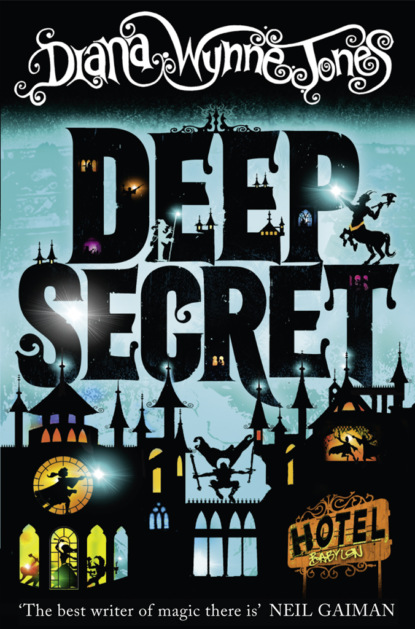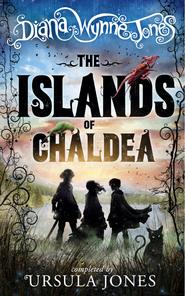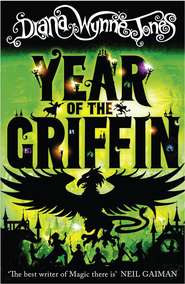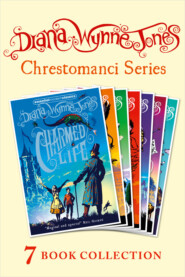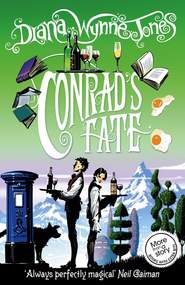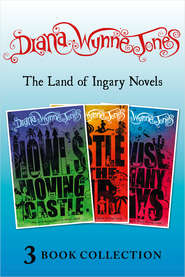По всем вопросам обращайтесь на: info@litportal.ru
(©) 2003-2024.
✖
Deep Secret
Настройки чтения
Размер шрифта
Высота строк
Поля
“Do you mind holding your Sabbath somewhere else?” I said. I had meant to say much more, but I had got so far when the traces of her personality hit me. She was Mallory. Of course. She had done nothing but lead me a dance all along.
She stopped dancing. She turned to me as if I had just crawled out of a sewer. Then, with immense disgust, she put one of her outsize fingernails to the bridge of her glasses and looked me up and down all over again.
Two can play at that game. I took my left lens between my finger and thumb and focused the look right back at her. “Maree Mallory, I presume,” I said contemptuously, before she had quite got round to speaking.
“Get lost,” she said, as she had been meaning to say all along. She had an unpleasingly loud, gloomy voice, with a sort of sob embedded in it. Then, belatedly, she registered what I had said. “You may know me,” she retorted, “but I don’t know you and I don’t want to.” Beyond her, I saw the boy – who must be Nick Mallory and not the infant Janine had implied – looking as if he wanted to get down and lie under her car.
I was angrier than ever. It was the sob in her voice, I think. “Rupert Venables,” I said – or rather, snapped. “I wrote to you.” I let go of my lens and brought out my wallet. “I’ve been looking for you all over town to give you your wretched legacy. Here you are.” I held out to her in a fan the ten ten-pound notes I had made ready to support my story.
She looked dumbfounded. And, as I had hoped, she automatically put out her hand for the money. I counted the ten notes into it with angry ceremony. There began to be yells, whistles and cheers from the motorists watching across the road and from some of those behind, who were now either hanging out of their windows or standing irritably beside their cars. Mallory’s face turned a dull, furious red. Her cousin’s dark face was redder still. Mallory’s chin bunched and her hand flinched, as if she wanted to throw the notes into the road. But the money meant too much to her. She hung on to it.
“Ten,” I said, “making a hundred. Now will you please get into your bloody car and drive it out of my way!”
She did not answer, just strutted haughtily to her open door, to further hoots and cheers from the line of motorists. The boy folded himself in through the other door with the speed of an early silent film.
“Was it worth the money then?” the driver of the car behind mine called out, as I went back to my own car.
I wanted to say it was indeed worth £100, just to be able to wash my hands finally of Mallory and her family, but I could hardly explain why. I simply shrugged and smiled and got behind my wheel as Mallory started her car with a leap and roared away in a cloud of blue oily smoke. Her car was nothing like as elderly as the brown Morris. She just didn’t look after it, evidently.
I was glad I did not have Andrew with me on the way back. I was able to swear the whole way home. I arrived still raging.
“What’s the matter now?” Stan asked from my dark living room, over the remorseless rhythm of a Bach fugue.
“Mallory,” I said, snapping on the light. “If anyone wants to make that girl a Magid, it will be over my dead body! She’s… unspeakable! And ugly with it. Besides being mad.” And I angrily described my day’s adventures.
“Hm. Did she show any talent at all?” he asked.
“I’m sure she has bags of it,” I said. “Enough to keep me away from her all day. Which is where I want to stay! I don’t want any part of someone who uses their talent to hold up rush-hour traffic by dancing widdershins in the street. Not even ashamed of it, either! At least her teenage cousin had the grace to look embarrassed.”
“Look on the bright side,” Stan said. “Mallory can’t behave like a Magid. So you’ve eliminated one candidate. Now you can start thinking about the other four.”
“What fun!” I said savagely, and stormed into the kitchen. I said to myself as I tore open the fridge, “And how am I supposed to look at four people when they’re scattered all over the globe? Japan, New Zealand, Bosnia, Ohio – oh, fun!”
Stan had evidently followed me. His voice said at my shoulder, “I’ve been thinking about that.”
I slammed the fridge shut. “Don’t do that!”
“When you’ve had something to eat and cooled off a bit, I’ll tell you,” he said.
(#ulink_0cd56f61-d79c-5936-854e-2c5ccb1e3ade)
It took me another two hours to simmer down. That only happened when I admitted to myself that not only had I been hoping that Mallory would turn out to be Magid material, but I had also, on the basis of her personality trace, been building up a picture of a brave person in considerable adversity. She had a broken home, she had been jilted by this man Robbie, she had no money and was forced to live with a bitchy aunt, and on top of this her father (adoptive father, I supposed) was dying of cancer. I had been prepared to be wonderfully sorry for her. But all that went when I saw her grotesque baglike figure prancing at the side of the road. Then, after the way she had first ignored and then looked at me, I wanted to go and shake the hand of that ex-boyfriend and tell him he was well out of it. I was well out of it. It was worth a hundred quid – cheap at the price.
“Ready to talk now?” Stan asked.
“Yes,” I said.
“What you want to do,” he said, “is collect all your candidates in one place and interview them for the job. Am I correct?”
I had been brooding with my chin on my chest. I sat up. “But how?”
“The extreme way,” he said. “Tweak their fatelines. Bring them to you.”
“Is it permissible?” I said. I had thought that way was only for emergencies. Anything that involved meddling in someone’s personal life without their permission was to be considered only in extreme need.
“Yes, you’re allowed to do it if you’re choosing a new Magid. That’s important,” Stan said. “You’d be doing it anyway by appointing someone, if you think about it.”
“OK, but not tonight,” I said.
What Stan was suggesting was a fairly arduous process. I have always thought it lucky it is so difficult, or Magids – and other people – might be tempted to do it for trivial reasons. Done often, it could bring chaos to more than one world. It can also bring chaos down on the Magid who does the working, unless it is done carefully, with proper safeguards. If you don’t get it right, you can tangle your own fatelines disastrously with those of the people you are trying to influence. A Magid is supposed to be a free agent. One of the things which is done when you become a Magid is that your personal fatelines are freed from those of the rest of the multiverse. Rather a lonely state, actually.
Anyway, I knew it was going to take days and I didn’t want to be interrupted. The next day, I finished all my ordinary business (somewhat late, but too bad – Mallory’s fault) and then disconnected my phones from this world and the others. I shut down all the computers, including the one devoted to Magid business, and hung what amounted to a ‘Do Not Disturb’ notice on that one.
I was a little irritated to find a series of faxes from General Dakros had come in overnight. The first said triumphantly that his experts had deciphered the genetic codes on the two lists: they would be able to recognise all the heirs when they found them. The second told me that Knarros was still untraced; the third that Jeffros thought Knarros was hidden by magic. The fourth asked me outright to come and discover Knarros for them.
I faxed back briskly that I saw no reason why they should maintain the Emperor’s secrecy, and suggested that they advertise for Knarros in the media. Then I unplugged the machine.
“See?” I said to Stan. “Not sentimental at all.”
Then I set to work with a large globe of the world, pins and strands of cotton. It was important to find a point in this country to which it was best to summon my four candidates. Because this was fateline work, the place had to be a node of power (there are a surprising number of these nodes in the British Isles) and the distance between this place and each of the four people had to satisfy mathematical laws. It also had to be somewhere where any of them might naturally expect to go. Even though they would be tugged to this spot by a series of Magid-made accidents, I could not stretch the laws of probability too far for fear the three I did not select would notice.
This was why I ruled out all the solitary nodes like Stonehenge, or most castles, or that hidden valley in Derbyshire, and looked mainly at towns or at country places where there were conference centres. Before long, I was sitting in a heap of guidebooks and information leaflets, darting between these and the globe, and then to the detailed maps spread out on the floor. I needed a mundane, normal-seeming node. Stan was a great help here. As a jockey, he had rushed all over the country to racecourses in every corner of it, and he knew hotels and nodes I had never heard of.
Myself, I had hoped to bring everyone together in London, but that did not satisfy the numerical conditions. Annoyingly, it would have been fine had Mallory still been in the equation. I found I was interrupted here by a great rush of anger and exasperation at Mallory. How dared she lead me such a dance! How dared she go on doing so, even when I had eliminated her!
Stan recalled me by suggesting we considered some of the nodes in the Midlands. There are some good strong ones there. I wondered about Nottingham, but the numbers were off there too.
“Pity, that,” Stan said. “Nottingham’s a place where everyone goes sooner or later. All sorts of reasons. You want a lot of reasons. Concerts, conferences – or a racecourse would do it.”
“There are reasons for going to Birmingham,” I said, “but the node there’s only a pinprick. How about Stratford-upon-Avon?”
“Too many tourists,” he said. “Is Wigan any good?”
Wigan was numerically wrong. After hours of discussion and measuring and reading brochures, we settled on a medium-sized town called Wantchester. We both knew it. Stan said there were at least two good hotels there because of the racecourse. The guidebook claimed there were conference facilities and a factory that made small-arms. These were clearly new since Stan’s day, and mine. Stan remembered a pleasant, sleepy town. My memories were from a summer holiday there with my family, and I mostly remembered the river. There had been a fishing competition there for children. I had been in the grip of a fishing craze – I suppose I would be about nine at that time – and I had eagerly enrolled in the competition. I fished all day without the slightest luck. I was, I remember, disentangling my line from a willow tree for at least the fortieth time when my brother Will arrived and wanted to try his luck too. He never wanted to be outdone by his younger brothers.
The supervisor must have been very good-humoured. He gave Will instructions and Will borrowed my rod, and the supervisor left us to it. Will, in his usual way of always succeeding at everything, almost instantly hooked a fine fat fish. He struck at precisely the right moment and landed it perfectly. Then there was terrible trouble, because Will couldn’t bear to kill it and neither could I. It flopped about madly. We shouted for the supervisor, but he was out of hearing, and we were forced to deal with it ourselves. Between us, we succeeded in getting the hook out of its mouth and we threw it back in the river, where it floated on its side, convulsing and obviously dying. Will realised he had half-killed it. He burst into tears, even though he was thirteen. I felt awful. I kept trying to get the fish out of the river again and I couldn’t. We were in this state when our brother Simon wandered by. Simon hates killing things, so he had kept away from the fishing. When he saw us, Will in tears and me white and dithering, he simply waded into the water, fetched out the fish and whacked its head on a stone. “There,” he said, and went on his way. I gave up fishing after that. Will never tried again.
Later on, these memories of Wantchester struck me as decidedly inauspicious. Maybe they did even at the time. If so, I dismissed them, because I was tired of looking. Wantchester fitted our requirements. Stan and I both knew the town. That was sufficient.
“Wantchester it is, then,” we said.
The next step was, of course, to go to the place and check it out. “I wish you could come too,” I said to Stan.
“You don’t need me to help you look at a town,” he said, threatening huffiness. I was beginning to see that Stan got irritated whenever I went somewhere without him. I said no more.
The next day I drove up to Wantchester and found the place still very pleasant, despite a one-way system and the cold wind of late February. I even took a walk by the river for old times’ sake. There were willow trees, currently bare, and brown water swirling under the bridge, just as I remembered, but the river walk was curtailed since that far-off holiday by the new factory built on the riverside. So I walked back into the town, to the large hotel I had seen standing across the end of the main square. The hotel I remembered dimly, although we had stayed in a guest-house, but my chief memory was of the way the square was more like a very wide street, with a market in it. To my joy, the square (or street) was full of stalls that day too, and I stared at crockery, fruit and clothing, much as there had been when I was a nine-year-old, all the way to the hotel.
I was rather disconcerted to find it was called Hotel Babylon.





